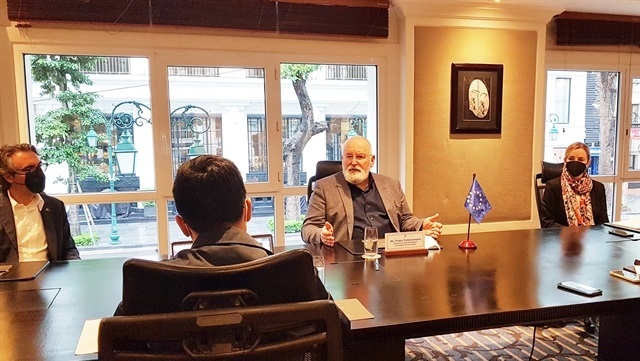 |
|
European Commission Vice President Frans Timmermans (centre, right) speaks to the media at a press briefing in Hà Nội on Saturday. |
The meeting was part of the EC Vice President Frans Timmermans’ three-day visit to Việt Nam.
The grant aims to reinforce bilateral cooperation between the European Union and Việt Nam by advancing common interests in three priority areas, according to Timmermans.
They are climate-responsive digital circular economy, responsible entrepreneurship and enhanced skills for decent employment, and strengthening governance, rule of law and institutional reform.
The grant is part of the EU’s multiannual indicative programme for Việt Nam, which lasts from 2021 to 2027.
The adoption of the programme is an important step in reinforcing and strengthening the EU’s cooperation with Việt Nam. It will enable the two sides to continue working together on programmes and projects built on shared objectives, principles and values.
The agreed priorities will be implemented in partnership with the EU Member States in a Team Europe approach. They are in line with the UN’s 2030 Agenda, the Paris Agreement and the EU’s Global Gateway Strategy.
Speaking to the press, Timmermans said he highly valued the commitment made by Prime Minister Phạm Minh Chính to reduce greenhouse gas emissions at the UN Climate Change Conference (COP26) in Glasgow.
He said: “Việt Nam has taken an ambitious step in aiming for net-zero emissions by 2050. Meeting this target is a huge task, and requires, first and foremost, putting an end to new plans for unabated coal-fired power generation, and phasing down coal power generation.
“The European Union stands ready to continue its support for Việt Nam’s green transition. Việt Nam has tremendous potential for further renewable energy development, and over the past days we have discussed ways in which Europe’s own experience, expertise and financial support can help accelerate this transition.”
Net-zero emissions means achieving a balance between the greenhouse gases put into the atmosphere and those taken out.
Việt Nam’s greenhouse gas emissions started increasing in 1990. Coal burning, the most CO2 intensive fossil fuel mostly used to produce electricity, has tripled over the last 10 years, according to the Climate Transparency Report.
The country committed to phase out and not build or invest in new coal-fired power plants under the Global Coal to Clean Power Transition Statement at COP26.
Timmermans also visited the construction of the Metro Line No 3, one of the landmarks in Hà Nội that will contribute to the “green” transition, and spoke to organisations that promote sustainable agricultural practices and organic, eco-fair produce.
Source: VNS